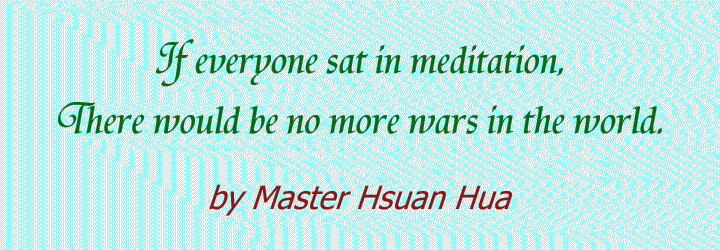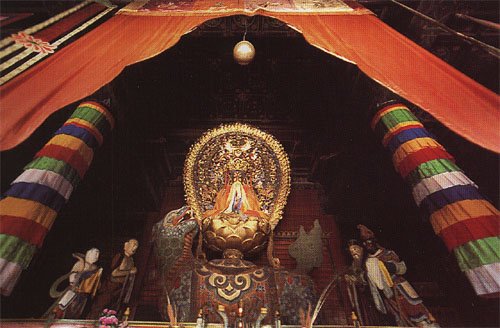|
What is Chan? Chan is the Chinese transliteration of the Sanskrit word "Dhyana." The complete transliteration is Chan now. Since the Chinese like to abbreviate, they call it Chan. It means "thought cultivation" and "quieting one's thoughts." Because we are ordinarily deluded by the six sense organs (eyes, ears, nose, tongue, body and mind), the six defilements (sights, sounds, smells, tastes, objects of touch, and Dharma ), and the six consciousnesses which arise between them, we forget to cultivate. "Thought cultivation," means we have to introspect, look within, reduce our false thoughts, stop the waves in our mind, and polish the mirror of our inherent nature. We must regulate the crazy mind and wild nature, and eradicate our desires and impurities. "Quieting one's thoughts," means not having thoughts, putting a stop to all idle thoughts. Only when sitting in meditation do we realize how many thoughts we have in our mind. They are like waves on great sea: the first one goes away and the next one follows right after. Our minds are always unreliable and disobedient. So when meditating, don't be afraid of having false thoughts. It is only fear that we won't recognize them as false thoughts, and that we will become turned by them.
In real Chan, you don't apply effort only when you are sitting; rather, you are applying effort whether you are walking, standing, sitting, or lying down-It is just that during sitting meditation, you have to be even more concentrated. Applying effort doesn't mean minding others business. One is mindful of the meditation topic, "Who is mindful of the Buddha?" all the time. Investigating Chan means to purify and focus the mind to a single point. Don't have any other thoughts so you won't waste your energy and exhaust your spirit. You learn to regulate the body and mind on detailed points, purifying the three karmas of body, speech and mind. When inherent wisdom manifests, you won't be stupid or afflicted anymore-you will return to the origin and find the great perfect mirror-wisdom of your own nature, and your light will illumine the universe. The Dharma-door of meditation is passive and yet not passive. You appear to be doing nothing. However, when one person investigates Chan, he is a person who is helping to increase the proper energy in the Dharma Realm. If everyone sat in meditation, there would be no more wars in the world. Buddhists who want to become Buddhas must sit in meditation. Everyday, they should cultivate Chan, without fearing the pain in their legs and backs; then can have success Therefore the ancients said,
|


